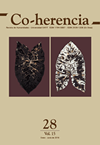Eleutheria in Aristotle
Main Article Content
Keywords
Aristotle, politics, liberality, virtue, ethics
Abstract
The concept of eleutheria has both political and cultural connotations for the ancient Greeks. It refers to the free condition of Greek citizens as opposed to the barbarian peoples who prefer tyrannical government. Plato and Aristotle also refer to eleutheria in a moral sense, that is, as the free condition of the virtuous man. But Aristotle refers to a virtue in particular: liberality. Liberality implies the prudent use of wealth, that is, the right mean between avarice and prodigality. The exercise of this virtue has repercussions in the political sphere. Firstly, because citizenship presupposes moral virtue in itself. Secondly, because the stability of the polis lies in the core of liberality: unbridled avarice or ambition put the stability of the polis at risk. Consequently, eleutheria has a unitary sense, which goes from the private to the political sphere.
Downloads
References
Andócides (2008). Sobre los misterios. En Discursos y fragmentos (pp. 185-256). Madrid: Gredos.
Aristóteles (1983). Ética nicomaquea (A. Gómez Robledo, Trad.). México: UNAM.
Aristóteles (1985). Retórica (A. Tovar, Trad.). Madrid: Centro de Estudios Constitucionales.
Aristóteles (2000). Política (A. Gómez Robledo, Trad.). México: UNAM.
Aristóteles (2012). La Politique (J. Tricot, Trad.). París: Vrin, 2012.
Broadie, S. (2007). Aristotle and Beyond. Essays on Metaphysics and Ethics. Cambridge: Cambridge University Press.
Curzer, H. J. (2012). Aristotle and the Virtues. Oxford: Oxford University Press.
Heródoto (1982). Historias (A. Ramírez Trejo, Trad.). México: UNAM.
Irwin, T. H. (1988). Disunity in the Aristotelian Virtues: A Reply to Richard Kraut. En J. Annas (Ed.), Oxford Studies in Ancient Philosophy (pp. 61-78). Oxford: Clarendon Press.
Jaeger, W. (1969). Aristotle. Fundamentals of the history of his development. Londres: Oxford University Press.
Liddell, H. G. & Scott, R. (1940). A Greek-English Lexicon. Revised and augmented throughout by Sir Henry Stuart Jones with the assistance of Roderick McKenzie. Oxford: Clarendon Press.
Ovidio (2008). Metamorfosis. Madrid: Gredos.
Pakaluk, M. (2005). Aristotle’s Nicomachean Ethics. Cambridge: Cambridge University Press.
Platón (2000). La República. México: UNAM.
Sherman, N. (1989). The fabric of character. Oxford: Clarendon Paperbacks.
Teofrasto (2015). Los caracteres. Madrid: Rialp.
Tomás de Aquino (1983). Comentario de la Ética a Nicómaco. Buenos Aires: Ediciones CIAFIC.
Tomás de Aquino (2001). Summa theologica. Madrid: Biblioteca de Autores Cristianos.




